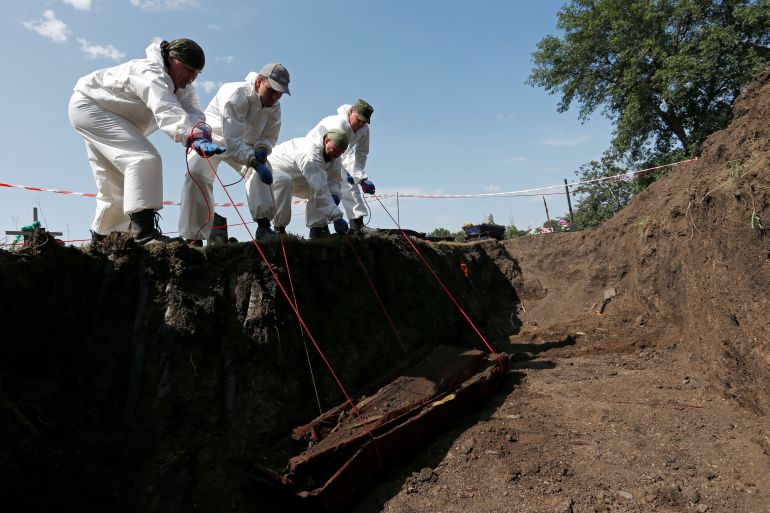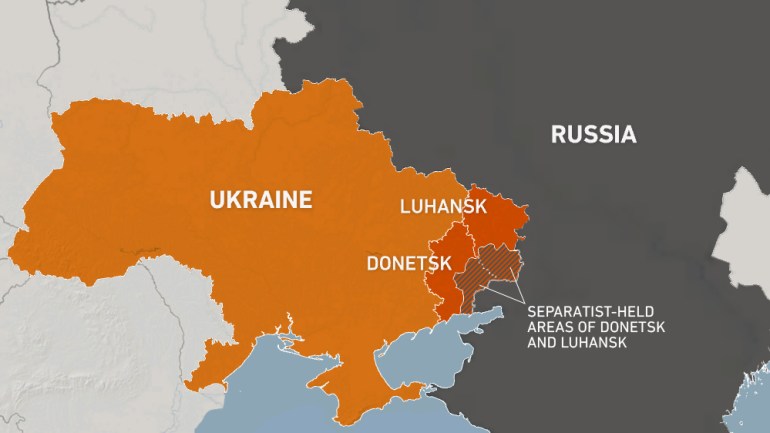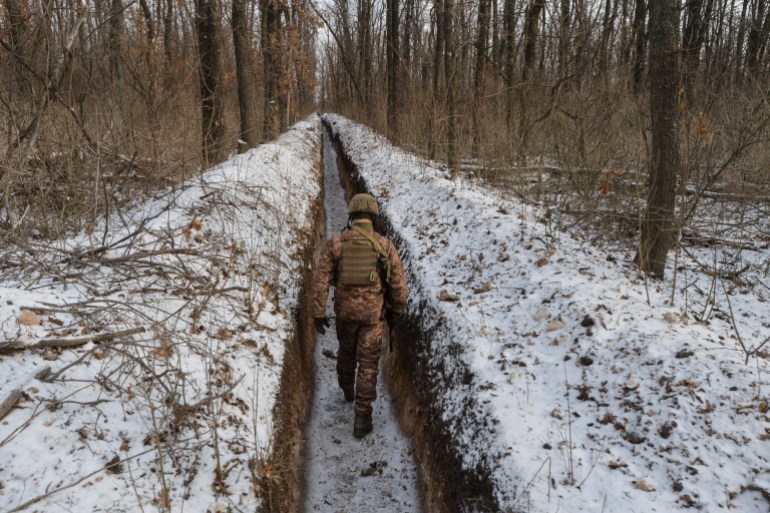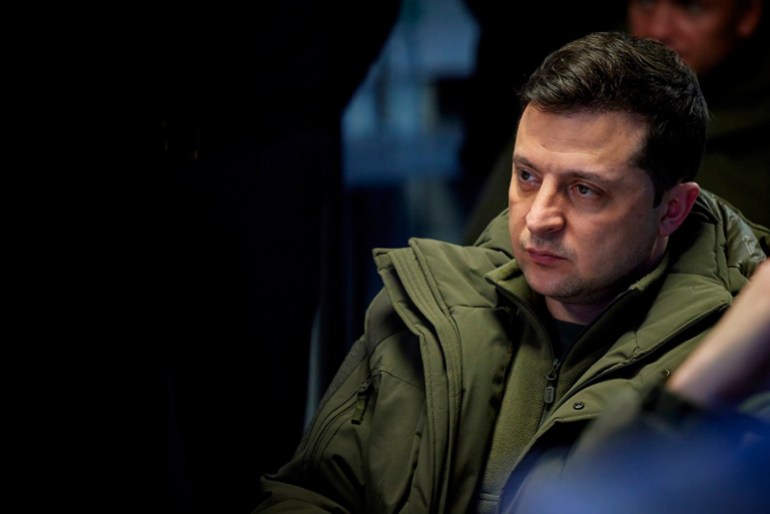‘Smells of genocide’: How Putin justifies Russia’s war in Ukraine
Experts analyse the Russian president’s claims of ‘genocide’ as justification for Moscow’s invasion of Ukraine.

Russia’s President Vladimir Putin has been telling Russians that the objective of his war in Ukraine is the “demilitarisation and denazification” of the Ukrainian government.
He claims Kyiv has been carrying out a “genocide” against the Russian-speaking population of the Donetsk and Luhansk regions, collectively known as the Donbas, where the Ukrainian army has been fighting Russia-backed separatists since 2014.
Keep reading
list of 2 itemsIs Putin likely to face the ICC over Russia’s actions in Ukraine?
The conflict that erupted after the rebels seized parts of the Donbas, and self-declared the Donetsk and Luhansk People’s Republics, killed about 14,000 people, including soldiers, civilians and rebel fighters.
“It smells of genocide,” Putin remarked in 2015.
Although a ceasefire was signed in the Belarusian capital of Minsk later that year, occasional gunfire and shelling rocked the region for the next seven years, until Moscow launched its invasion-dubbed-“peacekeeping operation” in February.
Russia has been arguing that what was happening to the residents of the Donbas region was a genocide, and it had a responsibility to step in and help them.
“Mass civilian causalities in any form demand our attention. That said, genocide carries a particular weight due to the international community’s moral and legal obligation to prevent it,” Alexander Hinton, director of the Center for the Study of Genocide and Human Rights at Rutgers University, told Al Jazeera.
The definition of genocide
The term genocide was coined by Polish-Jewish lawyer Raphael Lemkin in the 1940s, who lobbied the United Nations to recognise it as a crime in 1948.
The definition of genocide, according to the UN, is “acts committed with intent to destroy, in whole or in part, a national, ethnic, racial or religious group, as such”.
This encompasses not only mass murder but the destruction of their way of life, separating children from parents and raising them separately, and stopping new members of the group from being born.
Since genocide is seen as an exceptionally odious crime, particularly after the Holocaust, it is a powerful charge to throw at one’s opponents, who will rarely admit to such a stain on their national honour.
Russia’s probe
On February 16, the Investigative Committee of the Russian Federation opened a criminal case over four mass graves discovered in the Donetsk and Luhansk regions, pledging to investigate whether what happened in the area was a genocide.
“How else can one interpret the shelling of residential areas by Ukrainian Armed Forces using multiple rocket launchers or the discovered mass grave sites of almost 300 civilians near Lugansk, who were killed only because they considered Russian as their native language?” Anatoly Antonov, Russian ambassador to the United States, wrote on Facebook, using a Russian spelling of the region’s name and accusing Washington of willfully supporting genocide in Donbas.
American officials have repeatedly brushed off Moscow’s claims as propaganda.
Earlier, Russian ambassadors circulated material about atrocities in Donbas at the UN.
But experts say it is important to distinguish between collateral damage and deaths or injuries from reckless or indiscriminate firing, which both the Ukrainians and pro-Russian forces are certainly guilty of, and a concentrated effort to wipe out a peaceful population.

“Some casualties are lawful under international humanitarian law provided they do not cause excessive incidental loss of civilian life. Other attacks, depending on the context, could constitute war crimes, crimes against humanity or genocide,” Russian human rights lawyer Nataliya Sekretareva told Al Jazeera.
“What distinguishes the crime of genocide is the context: The attacks on civilians should be committed with intent to destroy, in whole or in part, a national, ethnical, racial or religious group, as such. So, answering your question, only genocide is committed with the intent to erase a group,” she said.
“To claim that Ukraine had been committing genocide in Donbas, Russia would have to prove that the Ukrainian government had been pursuing a deliberate policy of killing or otherwise targeting some national, ethnic, racial or religious group with the intent to destroy this group,” Sekretareva said.
“The mere fact that the deaths occurred during an armed confrontation cannot constitute genocide, especially considering that Ukraine did not even control the territory in question since 2015. How would the state perpetrate a genocide on the territories it doesn’t even have access to?”
Russian reports
A special report by the Russian state-run news outlet RT contains much of the material circulated at the UN, with eyewitness accounts of civilians being killed or wounded from shelling, rocket attacks and gunfire.
The vast majority of these accounts are dated back to 2014-2015, when the struggle over Donbas was the fiercest, although there are more recent entries.
Experts say while these are harrowing accounts of suffering – and there is little question civilians on either side have suffered – they still do not show anything suggesting this was part of an organised campaign to exterminate Russian speakers.

“It is well-documented that since 2014, both sides have committed human rights violation in Donbas and innocent people have been killed and abused,” said Hinton.
“But there is no credible evidence that genocide is taking place. None. Russia has made vague references to mass graves and civilian attacks. If it had proof, you can be sure Russia would have provided it long ago.”
In 2021, Russia filed a lawsuit with the European Court of Human Rights over the “war crimes of the Ukrainian army and nationalist battalions in the Donbas” and special committees were set up in the so-called Donetsk and Luhansk People’s Republics which reportedly found the bodies of 292 people in mass graves.
According to the Ukrainian organisation Truth Hounds, aside from an interview with a man who claimed his brother was buried there, there has been no confirmation from independent media or investigations, nor interviews or coverage of other grieving relatives.
Truth Hounds points out that it is odd this escaped publicity.
Responsibility to Protect
In 2005, all UN members agreed to the Responsibility to Protect (R2P) principle to prevent genocide, war crimes, ethnic cleansing and crimes against humanity.
R2P was invoked in Libya during the uprising against Colonel Muammar Gaddafi in 2011, with NATO enforcing a no-fly zone.
While at first Russia agreed, it soon saw the mission as going beyond its remit to protect civilians and instead actively facilitating regime change.
Regime change is one of Putin’s explicit aims in Ukraine, as he calls on the military to overthrow President Volodymyr Zelenskyy.
If Russia has proof of genocide taking place, why did it not formally bring its claims before the UN?

“Russia should have done so and pressed for action at the UN if it had credible concerns,” Hinton said.
“It claims that Ukrainians are attacking ethnic Russians and Russian speakers who Russia claims to be obliged to protect,” he said.
“That sounds reasonable in the abstract, but, again, Russia has not provided any credible proof to support its claim … It didn’t do so because Russia’s goal isn’t to save lives but to conquer Ukraine. Lavrov’s accusation is just another attempt to mask an invasion,” Hilton added.